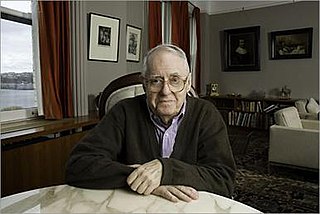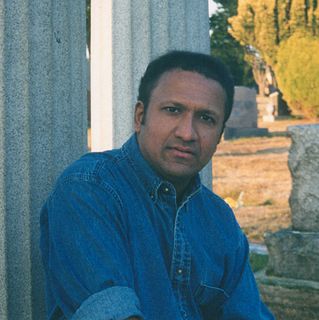Top 385 Skepticism Quotes & Sayings - Page 7
Explore popular Skepticism quotes.
Last updated on April 16, 2025.
I believe that part of what propels science is the thirst for wonder. It's a very powerful emotion. All children feel it. In a first grade classroom everybody feels it; in a twelfth grade classroom almost nobody feels it, or at least acknowledges it. Something happens between first and twelfth grade, and it's not just puberty. Not only do the schools and the media not teach much skepticism, there is also little encouragement of this stirring sense of wonder. Science and pseudoscience both arouse that feeling. Poor popularizations of science establish an ecological niche for pseudoscience.
All that the posture of skepticism accomplishes is to freeze the ego in an ignorantist poverty that never stretches or diversifies its resources of imagination or understanding. Any uncultured cretin can close his eyes and try to reduce the issues down to linear simplisms and say, "I am doubting, I am proving my magisterial or sovereign control over my own mind." Doubt is a useful and significant test of one's critical powers, but by itself it bears little if any significant cultural charge of enlightenment or satori; indeed it is the very opposite kind of thing.
As long as we try to project from the relative and conditioned to the absolute and unconditioned, we shall keep the pendulum swinging between dogmatism and skepticism. The only way to stop this increasingly tiresome pendulum swing is to change our conception of what philosophy is good for. But that is not something which will be accomplished by a few neat arguments. It will be accomplished, if it ever is, by a long, slow process of cultural change - that is to say, of change in common sense, changes in the intuitions available for being pumped up by philosophical arguments.
Freud, Jung thought, had been a great discoverer of facts about the mind, but far too inclined to leave the solid ground of "critical reason and common sense." Freud for his part criticized Jung for being gullible about occult phenomena and infatuated with Oriental religions; he viewed with sardonic and unmitigated skepticism Jung's defense of religious feelings as an integral element in mental health. For Freud, religion was a psychological need projected onto culture, the child's feeling of helplessness surviving in adults, to be analyzed rather than admired.
Those people who say that America is finite are some sense right. The environmental movement, for example, has a great wisdom to it: we need to protect, to preserve, to shelter as much as we need to develop. But I think this always has to be juxtaposed against the optimism of old, which is now represented in part by immigrants. I would like to see America achieve a kind of balance between optimism and tragedy, between possibility and skepticism.
I just think that the skepticism about truth has almost completely flipped - from being something associated with generally left-leaning progressives to being something which is a tool of right-wing populists and demagogues. I think a lot of those people writing books ten years ago would now think those books are no longer needed, they've kind of been vindicated.
I have serious problems with fundamentalist Christians and their creationist theories. Although I believe that scripture is divinely inspired and infallible, I have a hard time going along with the belief that the whole creation process occurred in six twenty-four hour days. My skepticism is due, in part, to the fact that the Bible says that the sun wasn’t created until the fourth day of creation (Genesis 1:16-19). I have a hard time figuring how twenty-four hour days could have been measured before that.
I have heard from my father and mother all the answers that faith in God could offer to those who doubt and search for the truth. In our home and in many other homes the eternal questions were more actual than the latest news in the Yiddish newspaper. In spite of all the disenchantments and all my skepticism I believe that the nations can learn much from those Jews, their way of thinking, their way of bringing up children, their finding happiness where others see nothing but misery and humiliation.
A lot of people hate my skepticism, and I think I understand why. The psychics offer wonders and endless possibilities in a world that often seems difficult and mundane. They promise health, wealth, wisdom, eternal life. But if you examine the record, it's not the psychics but the hard-nosed scientists who have actually delivered the things that improve human life. And, to me, science describes a world far more interesting than any psychic fantasy. It's a good world -- not perfect -- but it's ours. So we'd better learn to live with it, the way it is.
In England Giordano Bruno had given lectures on the plurality of worlds, and in that country had written, in Italian, his most important works. It added not a little to the exasperation against him, that he was perpetually declaiming against the insincerity, the impostures, of his persecutors - that wherever he went he found skepticism varnished over and concealed by hypocrisy; and that it was not against the belief of men, but against their pretended belief, that he was fighting; that he was struggling with an orthodoxy that had neither morality nor faith.
We could speak about the meaning of life vis-a-vis non-consequential/deontological theories, apodictic transformation schemata, the incoherence of exemplification, metaphysical realism, Cartesian interactive dualism, revised non reductive dualism, postmodernist grammatology and dicey dichotomies. But we would still be left with Nietzsche's preposterous mustache which instills great anguish and skepticism in the brain, which leads (as it did in his case) to utter madness. I suggest we go to Paris instead.
Emotions are far more contagious than any disease. A smile or a panic will spread through a group of people far faster than any virus ever could. When you walk into the office or a negotiation, then, wash your bad mood away before you see us. Don't cough on us, don't sneeze on us, sure, but don't bring your grouchiness, your skepticism or your fear in here either. It might spread.
Faith is the surrender of the mind; it's the surrender of reason, it's the surrender of the only thing that makes us different from other mammals. It's our need to believe, and to surrender our skepticism and our reason, our yearning to discard that and put all our trust or faith in someone or something, that is the sinister thing to me. Of all the supposed virtues, faith must be the most overrated.
As to how I would guide someone who is confused about the idea of God, I would suggest that he or she begins identifying what one might called "philosophical friends," - people with whom one could seriously examine our thought about God through listening to each other, reading important and useful books together and trying to think for oneself while familiarizing oneself with the ideas of some of the world's great thinkers. Cultivate openness without gullibility and skepticism without cynicism.
People are not "things" to be manipulated, labeled, boxed, bought, and sold. Above all else, they are not "human resources." They are entire human beings, containing the whole of the evolving universe, limitless until we start limiting them. We must examine the concept of leading and following with new eyes. We must examine the concept of superior and subordinate with increasing skepticism. We must examine the concept of management and labor with new beliefs. And we must examine the nature of organizations that demand such distinctions with an entirely different consciousness.
Infidelity and skepticism abound everywhere. In one form or another they are to be found in every rank and class of society. Thousands are not ashamed to say that they regard the Bible as an old obsolete Jewish book, which has no special claim on our faith and obedience, and that it contains many inaccuracies and defects. In a day like this, the true Christian should be able to set his foot down firmly, and to render a reason of his confidence in God's Word. He should be able by sound arguments to show good cause why he thinks the Bible is from heaven, and not of men.
What should we think of someone who never admits error, never entertains doubt but adheres unflinchingly to the same ideas all his life, regardless of new evidence? Doubt and skepticism are signs of rationality. When we are too certain of our opinions, we run the risk of ignoring any evidence that conflicts with our views. It is doubt that shows we are still thinking, still willing to reexamine hardened beliefs when confronted with new facts and new evidence.
But merely accepting authoritarian truth, even if that truth has some virtue, does not bring skepticism to an end. To blindly accept a truth one has never reflected upon retards the advance of reason. Our world rots in deceit. . . . Just as a tree bears the same fruit year after year and at the same time fruit that is new each year, so must all permanently valuable ideas be continually created anew in thought. But our age pretends to make a sterile tree bear fruit by tying fruits of truth onto its branches.
The decline of witch-belief was . . . entirely the product of religious skepticism. . . . The Catholic Church did not reform itself on this matter; it was forced by outside pressure to reform. To be sure, the Protestant churches were no better in this regard; it is simply that they had less time - only two or three centuries - to engage in the torching of witches. After all, John Wesley, the founder of Methodism, stated quite correctly that disbelief in witches meant a disbelief in the Bible.
Dance. Dance for the joy and breath of childhood. Dance for all children, including that child who is still somewhere entombed beneath the responsibility and skepticism of adulthood. Embrace the moment before it escapes from our grasp. For the only promise of childhood, of any childhood, is that it will someday end. And in the end, we must ask ourselves what we have given our children to take its place. And is it enough?
I came in with a healthy skepticism about these programs. My team evaluated them. We scrubbed them thoroughly. We actually expanded some of the oversight, increased some of the safeguards. But my assessment, and my team's assessment was that they help us prevent terrorist attacks. In the abstract, you can complain about 'Big Brother' and how this is a potential program run amok. But when you actually look at the details, then, I think we've struck the right balance.
In childhood our credulity serves us well. It helps us to pack, with extraordinary rapidity, our skulls full of the wisdom of our parents and our ancestors. But if we don't grow out of it in the fullness of time, our ... nature makes us a sitting target for astrologers, mediums, gurus, evangelists, and quacks. We need to replace the automatic credulity of childhood with the constructive skepticism of adult science.
This was the first time we had two ex-Soviet Cosmonauts in Houston. A lot of us, including me, viewed it with some skepticism, because I grew up during the Cold War, so I had been hit with all this propaganda all along that their stuff wasn't that good, it wasn't that safe and we were so much better. What I found out later was that their space stuff was very good and good enough that I was certainly comfortable flying on their equipment. So, it was kind of a revelation of sorts as the years went by and I think it underscores the importance right now of international cooperation.
There is a horrifying loneliness at work in this time. No, listen to me. We lived six and seven to a room in those days, when I was still among the living. The city streets were seas of humanity; and now in these high buildings dim-witted souls hover in luxurious privacy, gazing through the television window at a faraway world of kissing and touching. It is bound to produce some great fund of common knowledge, some new level of human awareness, a curious skepticism, to be so alone.
The question so often asked of modern painting, "What is it?", contains more than the dull skepticism of the man who is not going to have the wool pulled over his eyes. It speaks of a fundamental placement in relation to the work, that of a voyager in the world coming upon a strange object. The reader reconstitutes the work by his active participation, by approaching the object, tapping it, shaking it, holding it to his ear to hear the roaring within. It is characteristic of the object that it does not declare itself all at once, in a rush of pleasant naïveté.
























